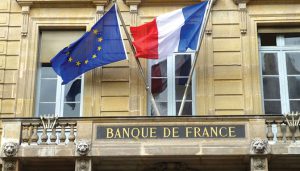Bloomberg
France’s central bank said the war in Ukraine is already affecting the economy and creating high uncertainty that makes it tricky to forecast how much inflation will accelerate or the extent to which the recovery from the Covid pandemic will slow.
Instead of publishing its regular economic projections, the Bank of France took the unprecedented step of presenting two scenarios. Its “conventional†scenario is based on forecasts from February 28, while a “downgraded†version accounts for the rise in oil, gas and wheat prices seen in early March.
Growth in 2022 will be about 0.5 percentage points lower due to the war in the first scenario, and 1 point lower in the second.
“It is a negative economic shock,†Bank of France Governor Francois Villeroy de Galhau said in an interview with Le Parisien newspaper. “It’s less growth, more inflation, but in proportions that are still uncertain.â€
With so much doubt over the effects of the war in Ukraine, economic policy makers throughout Europe are struggling to calibrate their reaction. Last week, the European Central Bank published a baseline projection and two additional negative scenarios, and gave itself more flexibility on when it would raise interest rates. Governments, meanwhile, are only at the early stages of discussions on new funding to cushion their economies.
French Finance Minister Bruno Le Maire said the government will present its so-called resilience plan in the coming days, but will only be able to update its growth forecasts once there is more stability on
energy markets.
“There is a real impact on the economy, but what is striking is that it is resisting,†Le Maire said on French television LCI. “The fundamentals of the French economy are solid.â€
Villeroy said any more fiscal support should remain “targeted and temporary†and French government should not repeat the “whatever-the-cost†approach it took to supporting the economy through the Covid pandemic.
Bank of France Chief Economist Olivier Garnier said the economy — which already reached pre-crisis levels last year — is also cushioned in the short term as energy prices surged when output was still rebounding rather than at the end of a cycle when activity would have been more vulnerable.
“In the scenarios we are presenting it’s more a case of slowflation than stagflation as we still have a bit of growth,†Garnier said.
 The Gulf Time Newspaper One of the finest business newspapers in the UAE brought to you by our professional writers and editors.
The Gulf Time Newspaper One of the finest business newspapers in the UAE brought to you by our professional writers and editors.
